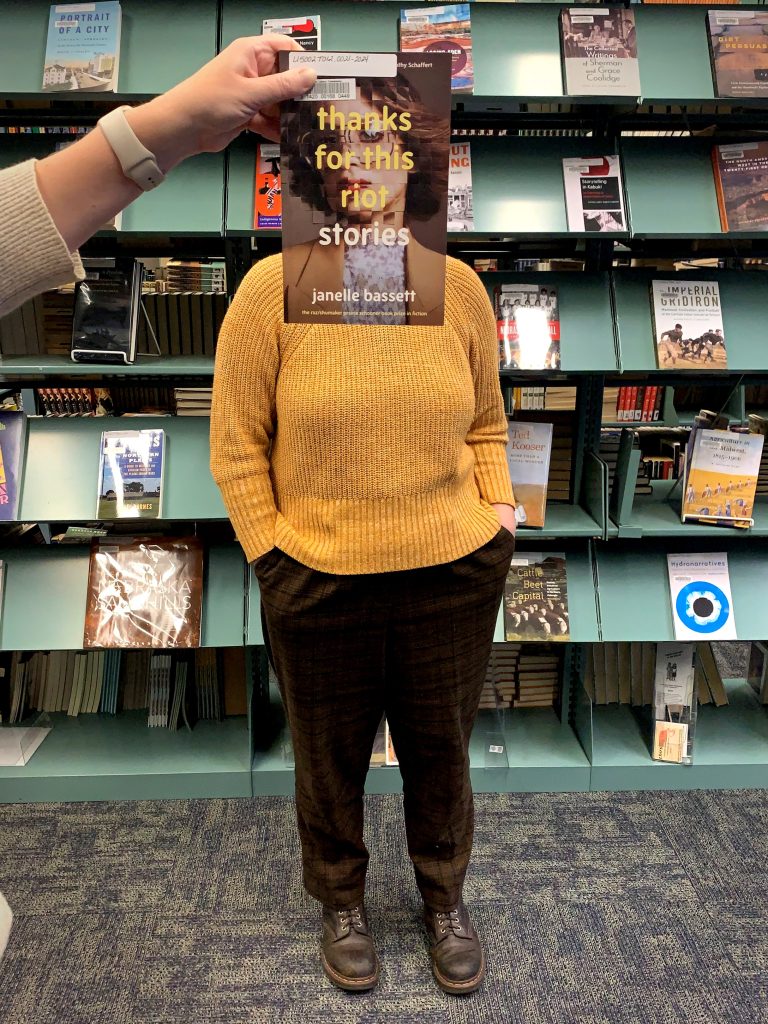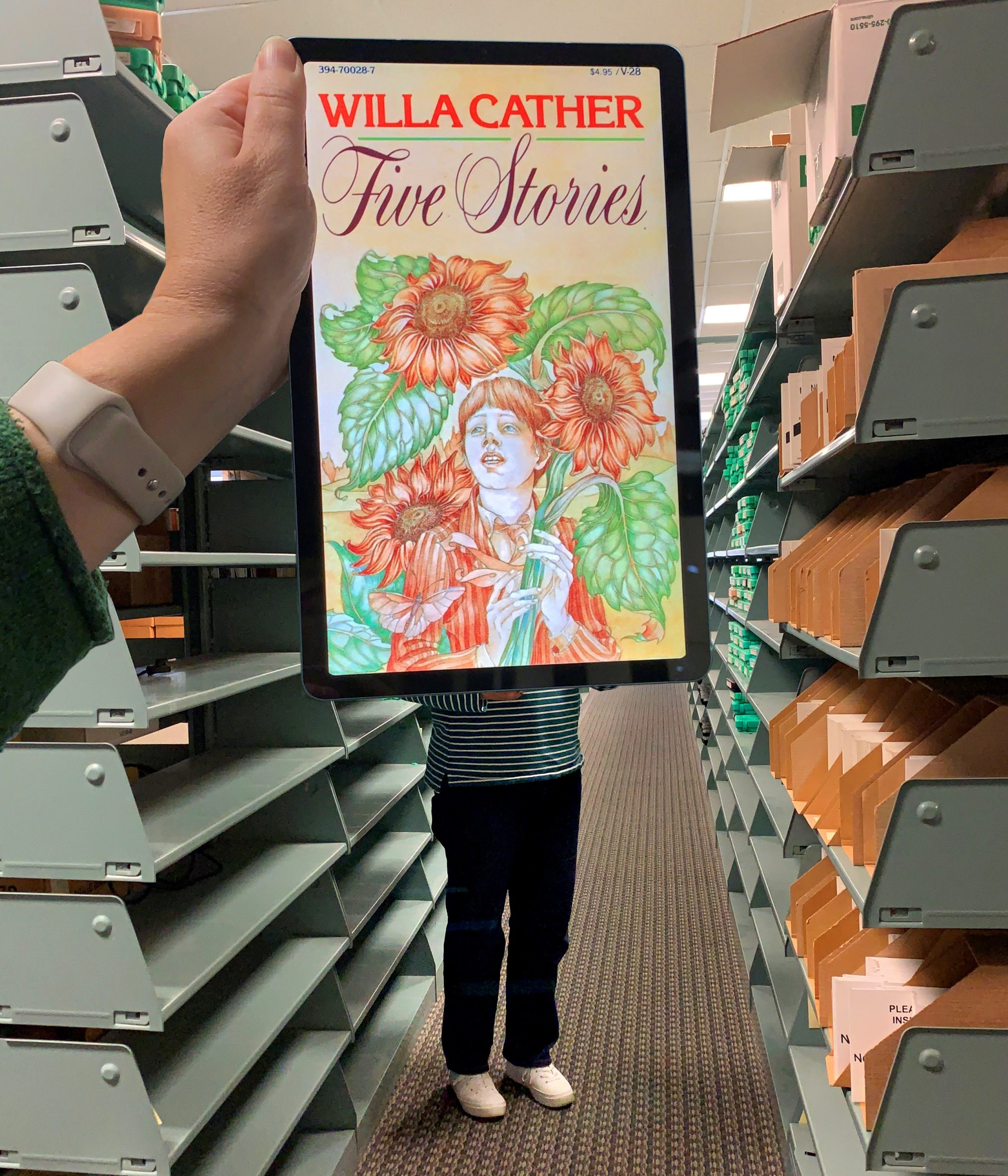Search the Blog
Categories
- Books & Reading
- Broadband Buzz
- Census
- Education & Training
- Friday Reads
- General
- Grants
- Information Resources
- Library Management
- Nebraska Center for the Book
- Nebraska Libraries on the Web
- Nebraska Memories
- Now hiring @ your library
- Preservation
- Pretty Sweet Tech
- Programming
- Public Library Boards of Trustees
- Public Relations
- Talking Book & Braille Service (TBBS)
- Technology
- Uncategorized
- What's Up Doc / Govdocs
- Youth Services
Archives
Subscribe
Tag Archives: Book Covers
#BookFaceFriday “Unlucky 13” by James Patterson & Maxine Paetro
This #BookFaceFriday can see the writings on the wall!
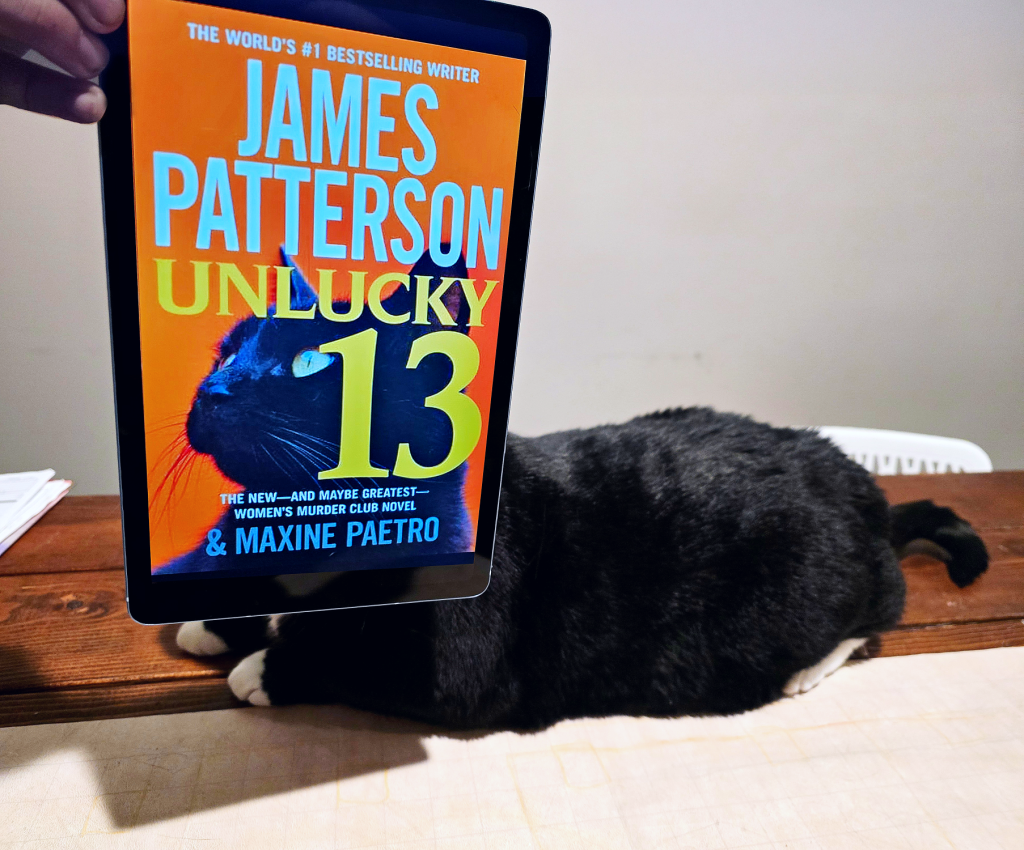
This week’s #BookFaceFriday isn’t superstitious at all! Happy Friday the Thirteenth, if you’re avoiding black cats, walking under ladders, or opening umbrellas indoors, this BookFace is not for you! Check out “Unlucky 13” by James Patterson and Maxine Paetro (Grand Central Publishing, 2015) it’s the thirteenth installment in Patterson’s “Women’s Murder Club” series. San Francisco Detective Lindsay Boxer is hoping the luck is on her side in this murder mystery thriller. We think your luck is changing because it’s available as a an eBook and Audiobook through Nebraska OverDrive Libraries, and can be found alongside the entire twenty four book “Women’s Murder Club” series all on OverDrive.
“Those who haven’t read any of the novels in the Women’s Murder Club series are cheating themselves.”
— BookReporter.com
Libraries participating in the Nebraska OverDrive Libraries Group currently have access to a shared and growing collection of digital downloadable audiobooks and eBooks. 194 libraries across the state share the Nebraska OverDrive collection of 26,898 audiobooks, 36,794 ebooks, and 5,133 magazines. As an added bonus it includes 130 podcasts that are always available with simultaneous use (SU), as well as SU ebooks and audiobook titles that publishers have made available for a limited time. If you’re a part of it, let your users know about this great title, and if you’re not a member yet, find more information about participating in Nebraska Overdrive Libraries!
Love this #BookFace & reading? We suggest checking out all the titles available for book clubs at http://nlc.nebraska.gov/ref/bookclub. Check out our past #BookFaceFriday photos on the Nebraska Library Commission’s Facebook page!
#BookFaceFriday “The Chronicles of DOOM: Unraveling Rap’s Masked Iconoclast” by S.H. Fernando Jr.
Who is that masked #BookFaceFriday?

It’s your favorite #BookFace’s favorite #BookFace! Check out “The Chronicles of Doom: Unraveling Rap’s Masked Iconoclast” by S.H. Fernando Jr.(Astra House, 2024). “MF Doom” was one of several alter-egos adopted by Daniel Dumile Jr., a prolific hip-hop artist that never appeared in public without a mask. It’s available as an eBook through Nebraska OverDrive Libraries, and is only one of more than 100 biographies and memoirs about musicians.
“Fernando provides a comprehensive look at DOOM’s life and career, meticulously researched through interviews with the rapper’s many collaborators and those closest to the man behind the mask. His track-by-track breakdowns of DOOM’s albums will have sample spotters diving into their record collections. A perfect pairing with Dan Charnas’s Dilla Time (2022), this is an essential exploration into the world of ‘your favorite rapper’s favorite rapper.”
— Carlos Orellana, Booklist (starred review)
Libraries participating in the Nebraska OverDrive Libraries Group currently have access to a shared and growing collection of digital downloadable audiobooks and eBooks. 194 libraries across the state share the Nebraska OverDrive collection of 26,898 audiobooks, 36,794 ebooks, and 5,133 magazines. As an added bonus it includes 130 podcasts that are always available with simultaneous use (SU), as well as SU ebooks and audiobook titles that publishers have made available for a limited time. If you’re a part of it, let your users know about this great title, and if you’re not a member yet, find more information about participating in Nebraska Overdrive Libraries!
Love this #BookFace & reading? We suggest checking out all the titles available for book clubs at http://nlc.nebraska.gov/ref/bookclub. Check out our past #BookFaceFriday photos on the Nebraska Library Commission’s Facebook page!
Posted in Books & Reading, General
Tagged Biography, Book Covers, bookface, bookfacefriday, books, hip hop, MF Doom, music, Nebraska OverDrive Libraries, rap music, Reading, S.H. Fernando
Leave a comment
Book Briefs: New University of Nebraska Press Books at the Nebraska Publications Clearinghouse
The Nebraska Publications Clearinghouse receives documents every month from all Nebraska state agencies, including the University of Nebraska Press (UNP).
UNP books, as well as all Nebraska state documents, are available for checkout by libraries and librarians for their patrons.Here are the UNP books the Clearinghouse received in September and October, 2024:
Abortion in Mexico : A History, by Nora E. Jaffary. Series: Engendering Latin America
Abortion in Mexico: A History concisely examines the long history of abortion from the early postcontact period through the present day in Mexico by studying the law, criminal and ecclesiastical trials, medical texts, newspapers, and other popular publications.
Nora E. Jaffary draws on courts’ and medical practitioners’ handling of birth termination to advance two central arguments. First, Jaffary contends, the social, legal, and judicial condemnation of abortion should be understood more as an aberration than the norm in Mexico, as legal conditions and long periods of Mexican history indicate that the law, courts, the medical profession, and everyday Mexicans tolerated the practice. Second, the historical framework of abortion differed greatly from its present representation. The language of fetal personhood and the notion of the inherent value of human life were not central elements of the conceptualization of abortion until the late twentieth century. Until then, the regulation of abortion derived exclusively out of concerns for pregnant people themselves, specifically about their embodiment of sexual honor.
In Abortion in Mexico Jaffary presents the first longue durée examination of this history from a variety of locations in Mexico, providing a concise yet comprehensive overview of the practice of abortion and informing readers of just how much the debate has evolved.
All Daughters Are Awesome Everywhere : Stories, by DeMisty D. Bellinger. Series: Zero Street Fiction
Fantastical, sensual, and as beguilingly strange as they are insightful and real, the stories of All Daughters Are Awesome Everywhere are centered around intimate familial or romantic relationships, featuring protagonists who make awesome discoveries—from the beautiful to the horrible—in seemingly mundane situations. The protagonists in each story come from marginalized communities, which sometimes exacerbates their problems but always allows for unique perspectives and epiphanies.
A violinist nearly hits a bicyclist with her car on her rush to rehearsal, leading to a blissful affair and speculation about the effect of love on her violin playing. The whispering of schoolgirls leads a teacher to consider her own fears and failings. In the title story the nature of motherhood, fatherhood, and familial pride plays against a backdrop of death and high school theater.
These are stories of human frailty and newfound strengths, with surprising confrontations. The writing is rich and playful, whether the characters are coy or startlingly direct, creating worlds in which the metaphorical might become literal in the blink of an eye. DeMisty D. Bellinger finds magic in the smallest moments and makes the biggest moments resonate with a quiet intensity.
Between Black and Brown : Blaxicans and Multiraciality in Comparative Historical Perspective, by Rebecca Romo, G. Reginald Daniel, and J. Sterphone. Series: Borderlands and Transcultural Studies
Between Black and Brown begins with a question: How do individuals with one African American parent and one Mexican American parent identify racially and ethnically? In answer, the authors explore the experiences of Blaxicans, individuals with African American and Mexican American heritage, as they navigate American culture, which often clings to monoracial categorizations.
Part 1 analyzes racial formation and the Blaxican borderlands, comparing racial orders in Anglo-America and Latin America. The Anglo-Americanization of “Latin” North America, particularly in the Gulf Coast and Southwest regions, shapes Black and Mexican American identities. Part 2 delves into Blaxicans’ lived experiences, examining their self-identification with pride and resilience. The book explores challenges and agency in navigating family, school, and community dynamics and discusses expectations regarding cultural authenticity. It also delves into Black and Brown relations and how situational contexts influence interactions. This work contributes to the discourse on multiracial identities and challenges prevailing monoracial norms in academia and society. Ultimately Between Black and Brown advocates for a more inclusive and nuanced understanding of identity, race, and culture.
The Dawn Patrol Diaries : Fly-Fishing Journeys Under the Korean DMZ, by James Card. Series: Outdoor Lives
While working as an English teacher and freelance journalist in South Korea for twelve years, James Card explored remote mountain valleys with a fly rod. In one of the most densely populated countries in the world, he discovered pristine streams holding rare native trout. Only a few hours from Seoul, Card spent years fly-fishing these streams completely alone. Eventually he shared these experiences with people from around the world, as the only fly-fishing guide in the country. Whether fishing alone or guiding clients, he often felt like he was on patrol, scouting new streams in remote valleys, many of which are near the Korean Demilitarized Zone.
In The Dawn Patrol Diaries Card writes about fly-fishing as well as South Korean landscape and culture. His travels range from the borders of the DMZ to inland mountain trout streams, from the rugged southern coast to the tidal flats of the western coast. He goes fly-fishing where battles of the Korean War were fought and offers vivid descriptions of the last wildlands in South Korea as well as insightful observations on the perils facing Korean cities, villages, and farms.
Dear Wallace, by Julie Choffel. Series: The Backwaters Prize in Poetry
Dear Wallace addresses the poet and insurance executive Wallace Stevens in an attempt to reconsider art, power, and creativity amid the demands of everyday responsibility. Exploring relationships between modernism, motherhood, poetry, and privilege, the speaker of these poems puts her daily routines in dialogue with his. Curious, funny, and wry, Julie Choffel confronts Stevens as an unlikely peer who lived and wrote in the same city and weather as she does now, imagining a present-day conversation about the many ways creative practice is informed by social context. As we struggle to marry creative independence with our communal obligations, the questions in these poems are more urgent than ever. Stevens, a proxy for beauty, inventiveness, and legitimacy, becomes an audience for the ennui, anxiety, and politics of care that characterize another kind of writer’s life today.
Disintergrating Empire : Algerian Family Migration and the Limits of the Welfare State in France, by Elise Franklin. Series: France Overseas: Studies in Empire and Decolonization
Disintegrating Empire examines the entangled histories of three threads of decolonization: the French welfare state, family migration from Algeria, and the French social workers who mediated between the state and their Algerian clients. After World War II, social work teams, midlevel bureaucrats, and government ministries stitched specialized social services for Algerians into the structure of the midcentury welfare state. Once the Algerian Revolution began in 1954, many successive administrations and eventually two independent states—France and Algeria—continuously tailored welfare to support social aid services for Algerian families migrating across the Mediterranean.
Disintegrating Empire reveals the belated collapse of specialized services more than a decade after Algerian independence. The welfare state’s story, Elise Franklin argues, was not one merely of rise and fall but of winnowing services to “deserving” clients. Defunding social services—long associated with the neoliberal turn in the 1980s and beyond—has a much longer history defined by exacting controls on colonial citizens and migrants of newly independent countries. Disintegrating Empire explores the dynamic, conflicting, and often messy nature of these relationships, which show how Algerian family migration prompted by decolonization ultimately exposed the limits of the French welfare state.
Dodge County, Incorporated : Big Ag and the Undoing of Rural America, by Sonja Trom Earys.
In 2014 Sonja Trom Eayrs’s parents filed the first of three lawsuits against Dodge County officials and their neighbors, one of the few avenues available to them to challenge installation of a corporate factory farm near their intergenerational family farm in Dodge County, Minnesota. For years they’d witnessed the now widely known devastation wrought by industrial hog operations—inhumane treatment of animals and people, pollution, the threat of cancer clusters, and more. They’d had enough. They also deeply understood an effect of Big Ag rarely discussed in mainstream media—the hollowing-out of their lifelong farming community and economy in service of the corporate bottom line.
In a compelling firsthand account of one family’s efforts to stand against corporate takeover, Dodge County, Incorporated tells a story of corporate malfeasance. Starting with the late 1800s, when her Norwegian great-grandfather immigrated to Dodge County, Trom Eayrs tracks the changes to farming over the years that ultimately gave rise to the disembodied corporate control of today’s food system. Trom Eayrs argues that far from being an essential or inextricable part of American life, corporatism can and should be fought and curbed, not only for the sake of land, labor, and water but for democracy itself.
Free Listening, by Naomi Waltham-Smith. Series: Provocations
Free Listening offers a radical reframing of seemingly intractable debates and polarized positions on free speech, academic freedom, systemic injustice, and political dissent by shifting attention from our voices to our ears. Instead of reclaiming the terrain of free speech that is increasingly ceded to conservatives, Naomi Waltham-Smith argues that progressives should assume a more radical task—to liberate listening from those frameworks that have determined what freedom looks like, who enjoys it, and at what cost. Refocusing on aural responsiveness forces a confrontation with the liberal tradition that has traditionally anchored claims for freedom of expression and inquiry. If listening is placed at the heart of public deliberation and disagreeing well, the relational, open-ended, and unpredictable character of free expression becomes a common good.
In a wide-ranging critical reflection on issues from civility to criticality, righteous anger to gentle listening, and silencing to streaming platforms, Free Listening makes an ambitious contribution to sound studies and political philosophy. Weaving together deconstruction, Black political thought, and decolonial theory, Waltham-Smith argues that the retort to accusations of “cancel culture” should be a revival of abolition democracy.
Ghostwalker : Tracking a Mountain Lion’s Soul Through Science and Story, by Leslie Patten.
Leslie Patten had seen grizzly bears, wolves, coyotes, deer, elk, and many other species in her years living next to Yellowstone National Park. Yet, like most visitors, she had never seen a mountain lion—the charismatic yet enigmatic predator also known as a cougar, panther, or puma. She had only detected their ethereal presence on the landscape, which left her pondering where they were and what they were up to. After five years, through her serendipitous encounters with their tracks and scat, the burning question remained: What is the essence of the mountain lion?
To understand an animal no one sees, Patten conducted more than one hundred interviews with biologists, conservation groups, state wildlife managers, houndsmen, and professional trackers. Slowly, a picture of the lion’s elusive nature emerged. Ghostwalker presents a complete picture of mountain lions in the West today, uncovering the intimacies of their secretive lifestyle as well as the issues they face in our changing world.
Great Plains Homesteaders, by Richard Edwards. Series: Discover the Great Plains
Great Plains Homesteaders tells the epic story of how millions of people, white and Black, women and men, young and old, and of many different religions, languages, and ethnic groups, moved to the Great Plains to claim land. Most were poor, so the government’s offer of “free” farms through the Homestead Act of 1862 seemed a godsend. The settlers found harsh growing conditions and many perils—including exploitation by railroads and banks, droughts, prairie fires, and bitter winters—yet they persisted. The settlers successfully “proved up” nearly a million claims between the 1860s and the 1920s. They filled up the immense grassland, transforming it into productive farms, the beginning of the region’s agriculture. They also created a distinct culture that continues to shape their estimated fifty million descendants living today.
Every homesteader’s experience was different, as particular and distinct as the people were themselves. Yet their collective story, with all its hardships and toil, its ambitions and setbacks, its fresh starts and failures and successes, is central to the American experience.
Homing : Instincts of a Rustbelt Feminist, by Sherrie Flick. Series: American Lives
Homing: Instincts of a Rustbelt Feminist traces the creative coming of age of a mill-town feminist. Sherrie Flick, whose childhood spanned the 1970s rise and 1980s collapse of the steel industry, returned to Pittsburgh in the late 1990s, witnessing the region’s before and its after.
With essays braiding, unbraiding, and then tangling the story of the author’s father with Andy Warhol, faith, dialect, labor, whiskey, Pittsburgh’s South Side Slopes neighborhood, grief, gardening, the author’s compulsion to travel, and her reluctance to return home, Flick examines how place shaped her experiences of sexism and feminism. She also looks at the changing food and art cultures and the unique geography that has historically kept this weird hilly place isolated from trendy change.
Carefully researched, deeply personal, and politically grounded in place and identity, Homing is an explicitly feminist and anti-nostalgic intervention in writing about the Rustbelt.
Informal Metropolis : Life on the Edge of Mexico City, 1940-1976, by David Yee. Series: Confluencias
In the 1940s, as Mexican families trekked north to the United States in search of a better life, tens of millions also left their towns and villages for Mexico’s major cities. In Mexico City migrant families excluded from new housing programs began to settle on a dried-out lake bed near the airport, eventually transforming its dusty plains into an informal city of more than one million people.
In Informal Metropolis David Yee uncovers how this former lake bed grew into the world’s largest shantytown—Ciudad Nezahualcóyotl—and rethinks the relationship between urban space and inequality in twentieth-century Mexico. By chronicling the residents’ struggles to build their own homes and gain land rights in the face of extreme adversity, Yee presents a hidden history of land fraud, political corruption, and legal impunity underlying the rise of Mexico City’s informal settlements. When urban social movements erupted across Mexico in the 1970s, Ciudad Nezahualcóyotl’s residents organized to demand land, water, and humane living conditions. Though guided by demands for basic needs, these movements would ultimately achieve a more lasting significance as a precursor to a new urban citizenry in Mexico.
In the first comprehensive history of modern housing in Mexico City, Yee challenges widely held assumptions about urban inequality and politics in Mexico.
Jagadakeer : Apology to the Body, by Lori Bedikian. Series: The Raz/Shumaker Prairie Schooner Book Prize in Poetry (Winner)
Jagadakeer: Apology to the Body presents the voice of a daughter of immigrant parents, now gone, from Lebanon and Syria and of Armenian descent. In this five-part testimony Lory Bedikian reconstructs the father figure, mother figure, and the self. Using a sestina, syllabics, prose poems, and longer poetic sequences, Bedikian creates elegies for parents lost and self-elegiac lyrics and narratives for living with illness. Often interrupted with monologues and rants, the poems grapple with the disorder of loss and the body’s failures. Ultimately, Bedikian contemplates the concept of fate, destiny (jagadakeer), and the excavation of memory—whether to question familial inheritance or claim medical diagnoses.
Leaked Footages, by Abu Bakr Sadiq. Series: African Poetry Book (Winner of the Sillerman First Book Prize for African Poets)
The poems in Leaked Footages carry urgent subjects, ranging from death to disappearance to grief to memory. Not only do the poems fulfill the tradition of witnessing often manifested in contemporary poets such as Garous Abdolmalekian and Ilya Kaminsky, but they extend that tradition by the medium through which they witness: the technical and the technological. Here, the camera, the closed-circuit TV, cinematographic techniques, and the cyborg are trusted for truth telling. Reality is represented in footage seen through the eyes of multifaceted speakers.
In Abu Bakr Sadiq’s exploration of northern Nigeria in speculative poetry, the lyrical meets the chronicle. In this fusion of Afrofuturism with experimental poetic techniques, the reader witnesses a country ravaged by terrorism and the consequences of war, as well as the effects of these on those who survive. While the tone is grave with concern and conscience, the poems do not take the easy route of sentiment. Instead, attention is paid to structure—from the erasure poems that are informed by the theme of disappearance to the contrapuntal poems that are influenced by the testaments of leaving.
Modern Responsa : An Anthology of Jewish Ethical and Ritual Decisions, by Pamela Barmash. Series: JPS Anthologies of Jewish Thought
An original anthology of modern responsa (Jewish ethical and ritual decision-making) by rabbinic authorities, men and women, across movements (Conservative, Orthodox, Reform), geographic locales, and ethnicities (Ashkenazic, Sefardic, Mizraḥi), Modern Responsa engages readers in understanding how rabbis expert in Jewish law apply principles, precedents, and rules from Judaism’s legal tradition to real-life issues.
Responsa on ten topics—personal and business ethics, ritual, personal status, women, LGBTQIA+ people, medical ethics, the COVID-19 pandemic, relationships with the other, the modern State of Israel, and Jewish life in the United States—showcase how the rabbinic decisors who wrote them handle modern quandaries for their communities. Pamela Barmash’s translations open up most of these original Hebrew texts to English-speaking readers for the first time. Sometimes the decisors disagree—but other times they rule similarly, despite differing ideological commitments. Clear explanations of how the decisors build their arguments along with historical background, decisor biographies, implications, and a glossary enable general adult and teen readers as well as scholars to grasp the finer points of Jewish ethical and ritual decision-making.
Ultimately, Modern Responsa illuminates the dynamic nature of Jewish law, the creativity of Jewish legal writings, and the multidimensionality of the Jewish experience in modernity.
Northern Paiutes of the Malheur : High Desert Reckoning in Oregon Country, by David H. Wilson, Jr.
In 1870 a twenty-six-year-old Paiute, Sarah Winnemucca, wrote to an army officer requesting that Paiutes be given a chance to settle and farm their ancestral land in Oregon Country. The eloquence of her letter was such that it made its way into Harper’s Weekly. Ten years later, as her people languished in confinement as a result of the Bannock War, she convinced Secretary of the Interior Carl Schurz to grant the requests in her letter and to free the Paiutes as well. Schurz’s decision unleashed a furious campaign of disinformation by the Bureau of Indian Affairs, cattlemen, and settlers, overturning Schurz’s decision, sweeping truth aside, and falsely branding Paiute chief Egan as instigator of the war.
To this day histories of the Paiutes appear to be unanimous in their mistaken claim that Egan led his Paiutes into the Bannock War. Indian agents’ betrayal of the people they were paid to protect saddled Paiutes with responsibility for a war that most opposed and that led to U.S. misappropriation of their land, their only source of life’s necessities. With neither land nor reservation, Paiutes were driven more deeply into poverty and disease than any other Natives of that era. In Northern Paiutes of the Malheur David H. Wilson Jr. pulls back the curtain to reveal what government officials hid—exposing the full jarring injustice and, after 140 years, recounting the Paiutes’ true and proud history for the first time.
Sandoz and the Battle of the Little Bighorn, by Renée M. Laegreid. Series: Sandoz Studies, Volume 2
Mari Sandoz’s The Battle of the Little Bighorn encouraged a change in how Americans viewed this infamous fight. By the mid-twentieth century a towering Custer myth had come to dominate the national psyche as a tale that confirmed national exceptionalism and continental destiny. Sandoz set out to dismantle this myth in an intimate account of the battle told from multiple perspectives. Although the resulting book received mixed reviews at the time, it has emerged through the decades as a visionary reinterpretation of the battle and a literary masterpiece.
Decades in the making, The Battle of the Little Bighorn was the renowned western writer’s last book, published after her death in 1966. The scholarly essays in this collection contextualize Sandoz’s work in the moment of its writing, situating her treatment of the past within the pivotal moments of her present. The essays address her incorporation of contemporary issues such as the Vietnam War, sensory history, gender study, recentering the Native perspective, environmentalism, and Sandoz’s personal challenge to completing her last book. The innovative insights into Sandoz’s perspective of the Battle of the Little Bighorn bring the historical acts involved, and her treatment of the site in which they occurred, into the twenty-first century.
The Spring Before Obergefall : A Novel, by Ben Grossberg. Series: The James Alan McPherson Prize for the Novel (Winner)
It’s not easy for anyone to find love, let alone a middle-aged gay man in small-town America. Mike Breck works multiple part-time jobs and bickers constantly with his father, an angry conservative who moved in after Mike’s mother died. When he’s not working or avoiding his father, Mike burns time on hookup apps, not looking for anything more. Then he meets a local guy, Dave, just as lonely as he is, and starts to think that maybe he doesn’t have to be alone. Mike falls hard, and in a moment of intimacy, his pent-up hopes for a relationship rush out, leading him to look more honestly at himself and his future.
Winner of the James Alan McPherson Prize for the Novel, Ben Grossberg’s The Spring before Obergefell is about real guys who have real problems, yet still manage to find connection. Funny, serious, meditative, and hopeful, The Spring before Obergefell is a romance—but not a fairytale.
Swallowing a World : Globalization and the Maximalist Novel, by Benjamin Bergholz. Series: Frontiers of Narrative
Swallowing a World offers a new theorization of the maximalist novel. Though it’s typically cast as a (white, male) genre of U.S. fiction, maximalism, Benjamin Bergholtz argues, is an aesthetic response to globalization and a global phenomenon in its own right.
Bergholtz considers a selection of massive and meandering novels that crisscross from London and Lusaka to Kingston, Kabul, and Kashmir and that represent, formally reproduce, and ultimately invite reflection on the effects of globalization. Each chapter takes up a maximalist novel that simultaneously maps and formally mimics a cornerstone of globalization, such as the postcolonial culture industry (Salman Rushdie’s Midnight’s Children), the rebirth of fundamentalism (Zadie Smith’s White Teeth), the transnational commodification of violence (Marlon James’s A Brief History of Seven Killings), the obstruction of knowledge by narrative (Zia Haider Rahman’s In the Light of What We Know), and globalization’s gendered, asymmetrical growth (Namwali Serpell’s The Old Drift).
By reframing analysis of maximalism around globalization, Swallowing a World not only reimagines one of the most perplexing genres of the late twentieth and early twenty-first centuries but also sheds light on some of the most perplexing political problems of our precarious present.
Thanks For This Riot : Stories, by Janelle Bassett. Series: The Raz/Shumaker Prairie Schooner Book Prize in Fiction (Winner)
Thanks for This Riot explores the limits of kindness, the weight of being needed, and the fear of being misunderstood. A group counselor is taunted by a truth-divining piano bench, a voice actor shouts her abortion at the state capitol, a tired caregiver tangles with a pair of stand-up comics, a small-town newspaper office shelters an otherworldly tattletale, a backwoods acupuncturist leans on her least-exciting offspring, a girl in a strapless bra takes a vengeful go-kart ride, and a woman gets surgery to lower her expectations (she thinks it went “okay”). Grouped by types of riot—external riots, internal riots, and laugh riots—Thanks for This Riot is a poignant and mordantly funny collection with a distinctly feminist viewpoint.
Truth and Power in American Archaeology, by Alice Beck Kehoe. Series: Critical Studies in the History of Anthropology
In Truth and Power in American Archaeology, archaeologist and ethnohistorian Alice Beck Kehoe presents her key writings where archaeological fieldwork, ethnohistorical analysis, postcolonial anthropology, and feminist analysis intersect to provide students and scholars of anthropology an overview of the methodological and ethical issues in Americanist archaeology in the last thirty years.
Truth and Power in American Archaeology brings together Kehoe’s broad-ranging, influential articles and previously unpublished lectures to explore archaeology’s history, methods, concepts, and larger imbrication in knowledge production in the West. With her contextualizing introductions, these articles argue for recognition of scientific method in the historical sciences of archaeology, paleontology, and geology; empirically grounded understandings of American First Nations’ ways of life and scientific knowledge; discussion of archaeology as expanded histories; a view of American archaeology’s social contexts of Manifest Destiny ideology, Cold War politics, and patriarchy; and a postcolonial historicist understanding of America’s real deep-time history and of the imperialist racism entrenched in mainstream American archaeology.
**Pictures and Synopses courtesy of University of Nebraska Press.
#BookFaceFriday “Five Presidents” by Clint Hill with Lisa McCubbin
#BookFace for President!
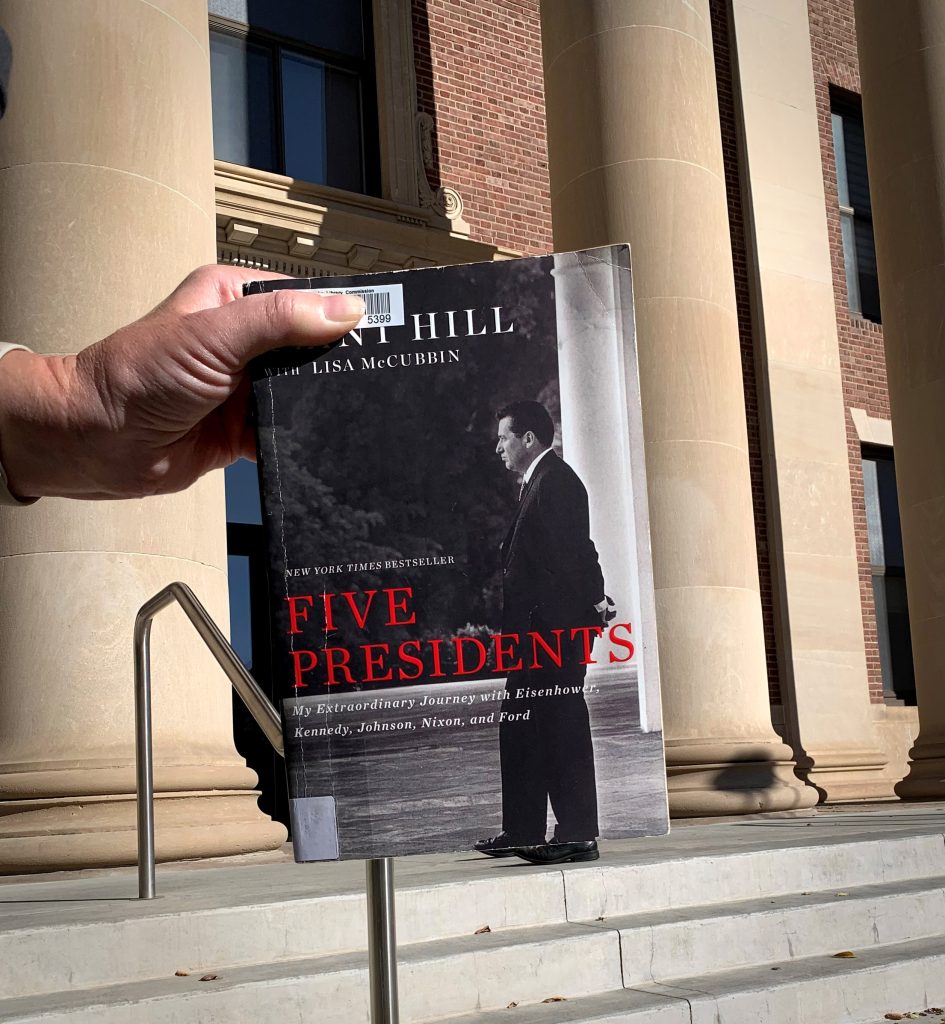
“Decisions are made by those who show up,” quoting Josiah Bartlet, and ultimately Aaron Sorkin, we want to reiterate the sentiment to get out there and vote. With election day next week, we thought we’d give you a run down on a few of the resources available at the Nebraska Library Commission. Whether your looking for voter information like overseas voting, early/absentee voting, voter check, or just need help finding your polling place check out our NebraskAccess: Election and Politics webpage for helpful links. If you love a good presidential biography or memoir we have a large selection in the Nebraska OverDrive Libraries collection, just search President! Or if you’re just looking to get away from it all we have a specially curated collection in OverDrive for “Political Fantasy.” Not to forget our large collection of book club kits includes many autobiographies, biographies, and memoirs, like this week’s #BookFace, “Five Presidents: My Extraordinary Journey with Eisenhower, Kennedy, Johnson, Nixon, and Ford” by Clint Hill with Lisa McCubbin (Gallery Books, 2017.)
“Hill’s humanity shines in the rich descriptions of the history he witnessed. The book gives nonpartisan insight about the human side of three Republican and two Democratic presidents. It discloses the huge protective challenges secret service agents face around the clock. Hill also reports many titillating personal events and shares candid views of the swarms of personalities that swirled around the White House.”
—Joseph H. Carter Sr. For The Oklahoman
Need a hand searching our collection? Here are some tips! You can browse our collection by genre or grade level, or use a keyword search to find exactly what your looking for. Still can’t find what you are looking for? Let us know and we’re happy to help.
Book Club Kits Rules for Use
- These kits can be checked out by the librarians of Nebraska libraries and media centers.
- Circulation times are flexible and will be based upon availability. There is no standard check-out time for book club kits.
- Please search the collection to select items you wish to borrow and use the REQUEST THIS KIT icon to borrow items.
- Contact the Information Desk at the Library Commission if you have any questions: by phone: 800/307-2665, or by email: Information Services Team
Love this #BookFace & reading? Check out our past #BookFaceFriday photos on the Nebraska Library Commission’s Facebook page!
#BookFaceFriday “A Grim Reaper’s Guide to Catching a Killer” by Maxie Dara
This #BookFaceFriday is a graveyard smash!
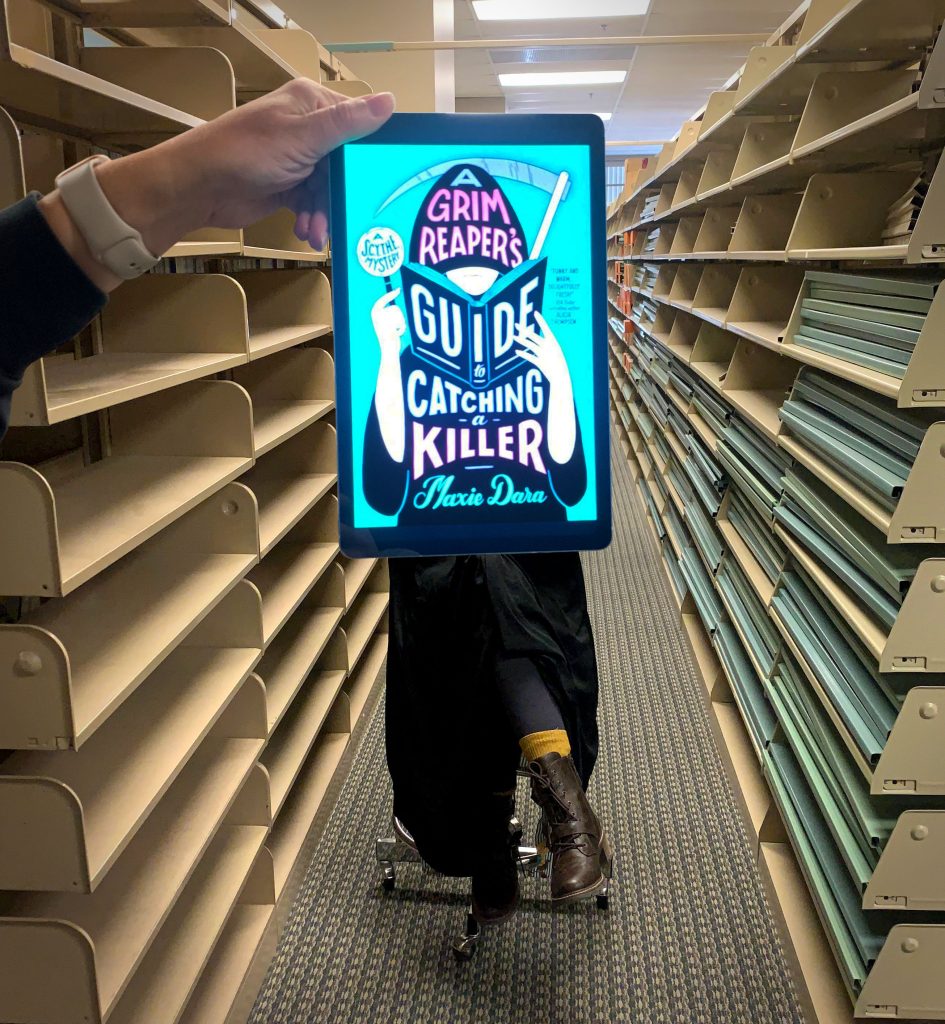
This week’s #BookFaceFriday is fully embracing spooky season! Join in with “A Grim Reaper’s Guide to Catching a Killer” by Maxie Dara (Berkley, 2024). This off-beat and humorous murder mystery is the first part in the author’s SCYTHE Mystery Series. It’s available as a an eBook and Audiobook through Nebraska OverDrive Libraries, and can be found in the specially curated collection “Monster Mash,” which is filled with Halloween, monster, or horror themed titles.
“Fun and lighthearted despite the presence of death, the characters are relatable and funny, and the paranormal aspects are balanced with the ordinariness of Kathy’s messy life. The ending fleshes out this creative premise and sets the book up for the next in a heartwarming series.”
— Booklist
Libraries participating in the Nebraska OverDrive Libraries Group currently have access to a shared and growing collection of digital downloadable audiobooks and eBooks. 194 libraries across the state share the Nebraska OverDrive collection of 26,898 audiobooks, 36,794 ebooks, and 5,133 magazines. As an added bonus it includes 130 podcasts that are always available with simultaneous use (SU), as well as SU ebooks and audiobook titles that publishers have made available for a limited time. If you’re a part of it, let your users know about this great title, and if you’re not a member yet, find more information about participating in Nebraska Overdrive Libraries!
Love this #BookFace & reading? We suggest checking out all the titles available for book clubs at http://nlc.nebraska.gov/ref/bookclub. Check out our past #BookFaceFriday photos on the Nebraska Library Commission’s Facebook page!
#BookFaceFriday “Breaking Rank” by Kristin D. Randle
Don’t let this #BookFace strong arm you!

Are your younger readers looking for a great book? Let us lend you a (tiny) hand in finding the right title! The Library Commission has a large collection of book club kits for children and young adults. Like this week’s #BookFace ,”Breaking Rank” by Kristen D. Randle (Turtleback Books, 2001), perfect for readers ages 12 and up; it’s a part of our Book Club Kit collection, with thirteen copies available for checkout. Diving into themes of peer pressure and independent thinking, this novel has been compared to The Outsiders, West Side Story, and Romeo and Juliet.
“This novel challenges stereotypes and stigmas when an unprecedented friendship develops between two teens of rival high school groups. “Randle is adept at conveying ingrained prejudices as well as the frustration and alienation that leads some youths to forsake the `straight’ world for a more friendly and accepting one of their own making.”
—Publishers Weekly
Need a hand searching our collection? Here are some tips! You can browse our collection by genre or grade level, or use a keyword search to find Golden Sower nominees and winners. If you need a large number of books for a whole classroom, limit your search to only those sets with enough books to meet your needs. Still can’t find what you are looking for? Let us know and we’re happy to help.
Book Club Kits Rules for Use
- These kits can be checked out by the librarians of Nebraska libraries and media centers.
- Circulation times are flexible and will be based upon availability. There is no standard check-out time for book club kits.
- Please search the collection to select items you wish to borrow and use the REQUEST THIS KIT icon to borrow items.
- Contact the Information Desk at the Library Commission if you have any questions: by phone: 800/307-2665, or by email: Information Services Team
Love this #BookFace & reading? Check out our past #BookFaceFriday photos on the Nebraska Library Commission’s Facebook page!
Posted in Books & Reading, General, Youth Services
Tagged Banned Books Week, Book Club Kits, Book Covers, bookface, bookfacefriday, Breaking Rank, Kristin Randle, Novel, Reading, YA
Leave a comment
#BookFaceFriday “Healer & Witch” by Nancy Werlin
We’ll cast a spell on you with this #BookFaceFriday!
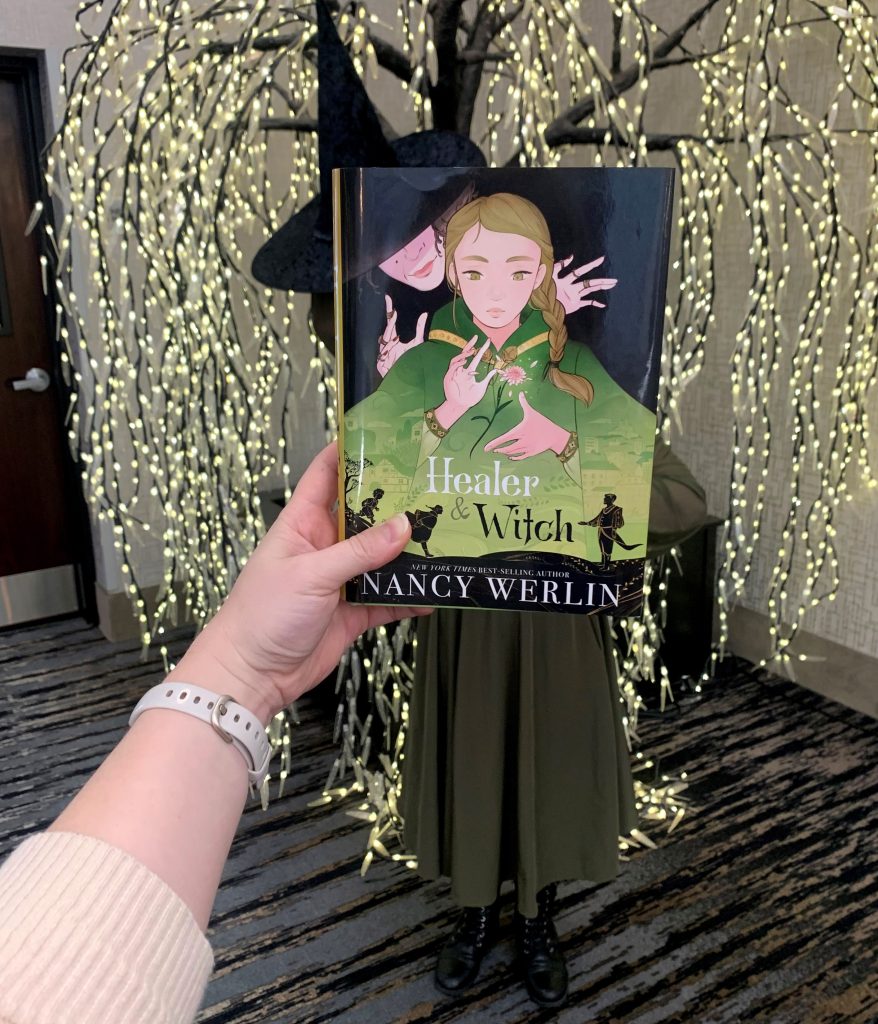
We’ve been at the Nebraska Library Association Conference this week connecting with Nebraska’s librarians and Library staff! Sally Snyder, NLC’s Children and Youth Services Coordinator, also had a table there full of her giveaway books, all available for libraries to take home with them. One of those books is this week’s #BookFace, “Healer & Witch” by Nancy Werlin (Candlewick Press, 2022). Perfect for middle grade readers, this coming-of-age YA novel is a fantasy and historical fiction story all rolled into one. All in all the perfect October read!
“Werlin’s first foray into middle grade is a thrilling and suspenseful experience; there are twisting reveals and adventure aplenty, though the story isn’t afraid to stop for lovely moments of
quiet contemplation and recollection along the way. A budding, respectful romance and hints of deeper powers will have readers hoping for a sequel. It’s well worth joining kind and clever Sylvie on her harrowing journey of discovery.”—Booklist (starred review)
This title comes from our large collection of children’s and young adult books sent to us as review copies from book publishers. When our Children and Young Adult Library Services Coordinator, Sally Snyder, is done with them, the review copies are available for the Library System Directors to distribute to school and public libraries in their systems.
Love this #BookFace & reading? Check out our past #BookFaceFriday photos on the Nebraska Library Commission’s Facebook page!
Posted in Books & Reading, General, Youth Services
Tagged Book Covers, bookface, bookfacefriday, Fantasy, Halloween, Healer & Witch, Historical Fiction, Nancy Werlin, Reading, YA books
Leave a comment
#BookFaceFriday “Unthinkable” by Helen Thomson
This #BookFace will blow your mind!
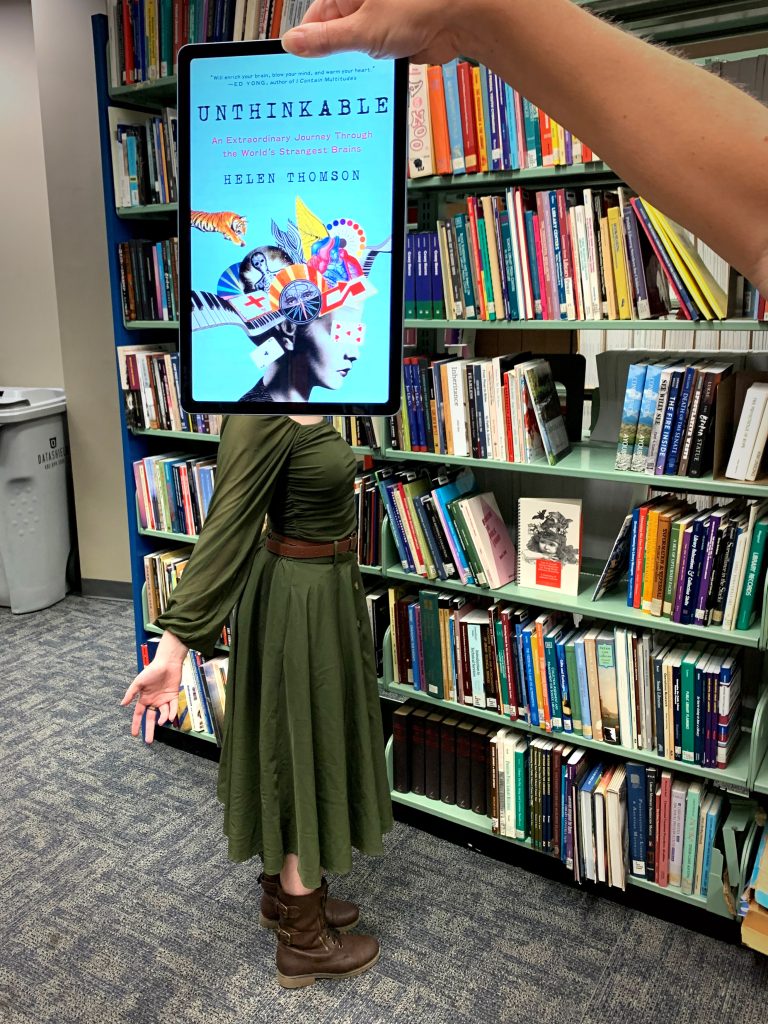
Free your mind, and the rest will follow. If you love learning through reading or just nonfiction books in general check out this week’s #BookFaceFriday, “Unthinkable” by Helen Thomson, it’s a nonfiction journey through some of the biggest mysteries of the human brain. You can find this title as an Audiobook through Nebraska OverDrive Libraries, it’s a part of the “Talk Nerdy to Me” curated collection in Overdrive.
“Thomson has a gift for making the complex and strange understandable and relatable. Oliver Sacks is noted as an inspiration and, indeed, this book will appeal to his many fans.”
—Library Journal (starred review)
Libraries participating in the Nebraska OverDrive Libraries Group currently have access to a shared and growing collection of digital downloadable audiobooks and eBooks. 194 libraries across the state share the Nebraska OverDrive collection of 26,898 audiobooks, 36,794 ebooks, and 5,133 magazines. As an added bonus it includes 130 podcasts that are always available with simultaneous use (SU), as well as SU ebooks and audiobook titles that publishers have made available for a limited time. If you’re a part of it, let your users know about this great title, and if you’re not a member yet, find more information about participating in Nebraska Overdrive Libraries
Love this #BookFace & reading? Check out our past #BookFaceFriday photos on the Nebraska Library Commission’s Facebook page!
Posted in Books & Reading, General
Tagged Book Covers, bookfacefriday, Helen Thomson, libraries, nonfiction, OverDrive, Reading, Unthinkable
Leave a comment
#BookFaceFriday “The Miseducation of Cameron Post” by Emily M. Danforth
This #BookFace is outstanding in its field!
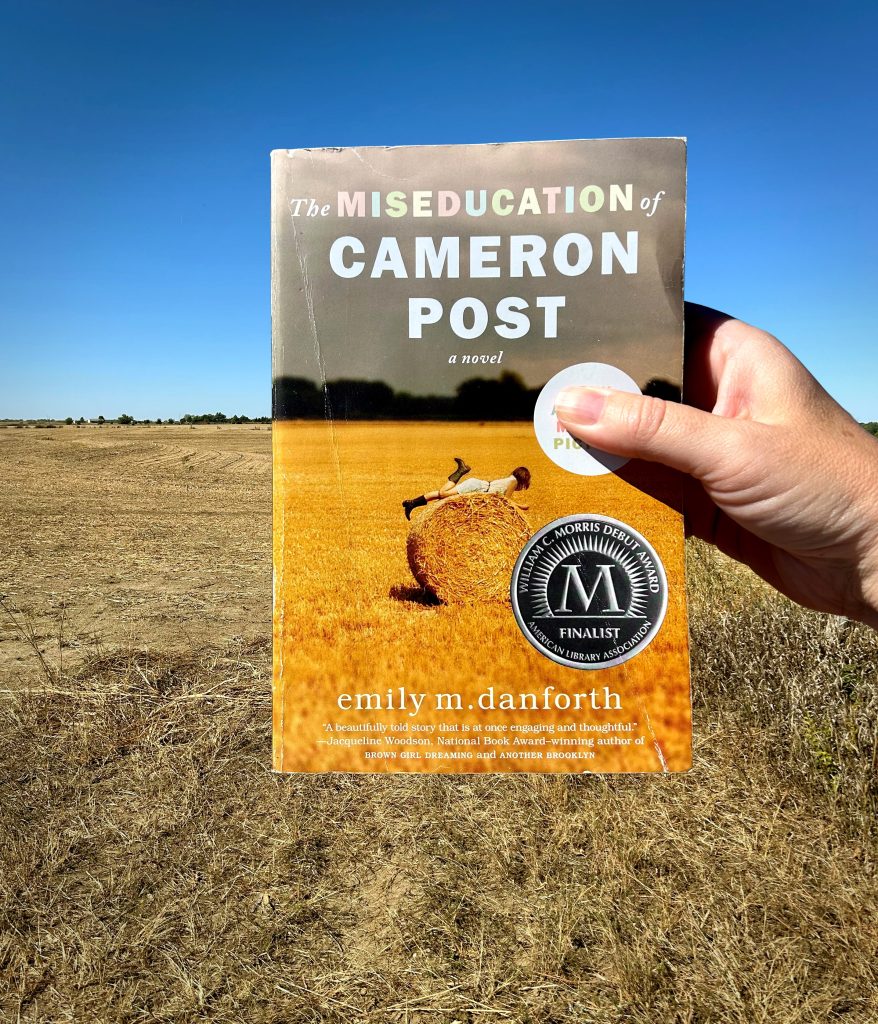
Freed between the lines! That’s the theme of this year’s #BannedBooksWeek. We are celebrating with a banned #BookFace! The Nebraska Library Commission supports readers and the freedom to read so we make sure our various collections reflect that. “The Miseducation of Cameron Post: A Novel” by Emily M. Danforth (Balzer + Bray, 2013) has been banned or challenged in the US since 2014, less than a year after it’s publication, cited for “inappropriate language, not appropriate for middle school age students.” It won The Montana Book Award and was a finalist for both the Morris Award and a Lambda Literary award. Emily Danforth was born in Montana and received her Ph.D in English-Creative Writing from the University of Nebraska-Lincoln! A book is considered challenged when calls are made for it to be banned or removed from the public’s access. This is one of many banned or challenged titles NLC has available in our Book Club Kit Collection, titles like The Perks of Being a Wallflower by Stephen Chbosky, Looking For Alaska by John Green, The Absolutely True Diary of a Part-Time Indian by Sherman Alexie, A Wrinkle in Time by Madeleine L’Engle, Beloved by Toni Morrison, and the Harry Potter Series by J.K. Rowling, just to name a few. This week’s #BookFace and other banned books can be found on the NLC Book Club Kit webpage. This service allows libraries and school librarians to “check out” multiple copies of a book without adding to their permanent collections, or budgets. NLC also has several banned or challenged titles available to our Nebraska OverDrive Libraries.
“This finely crafted, sophisticated coming-of-age debut novel is multilayered, finessing such issues as loss, first love, and friendship. An excellent read for both teens and adults.”
— School Library Journal (starred review)
You can find more information about Banned Books Week and the fight against censorship at ALA.org/advocacy/bbooks! What are you doing to celebrate Banned Books Week? Let us know!
Book Club Kits Rules for Use
- These kits can be checked out by the librarians of Nebraska libraries and media centers.
- Circulation times are flexible and will be based upon availability. There is no standard check-out time for book club kits.
- Please search the collection to select items you wish to borrow and use the REQUEST THIS KIT icon to borrow items.
- Contact the Information Desk at the Library Commission if you have any questions: by phone: 800/307-2665, or by email: Information Services Team
Love this #BookFace & reading? Check out our past #BookFaceFriday photos on the Nebraska Library Commission’s Facebook page!
Posted in Books & Reading, General
Tagged Banned Books Week, Book Club Kits, Book Covers, bookface, bookfacefriday, Lois Lowry, Reading, The Giver
Leave a comment
#BookFaceFriday “Haven’s Wake” by Ladette Randolph & “Hell or High Water” by Joy Castro
When one #BookFace closes, another one opens.
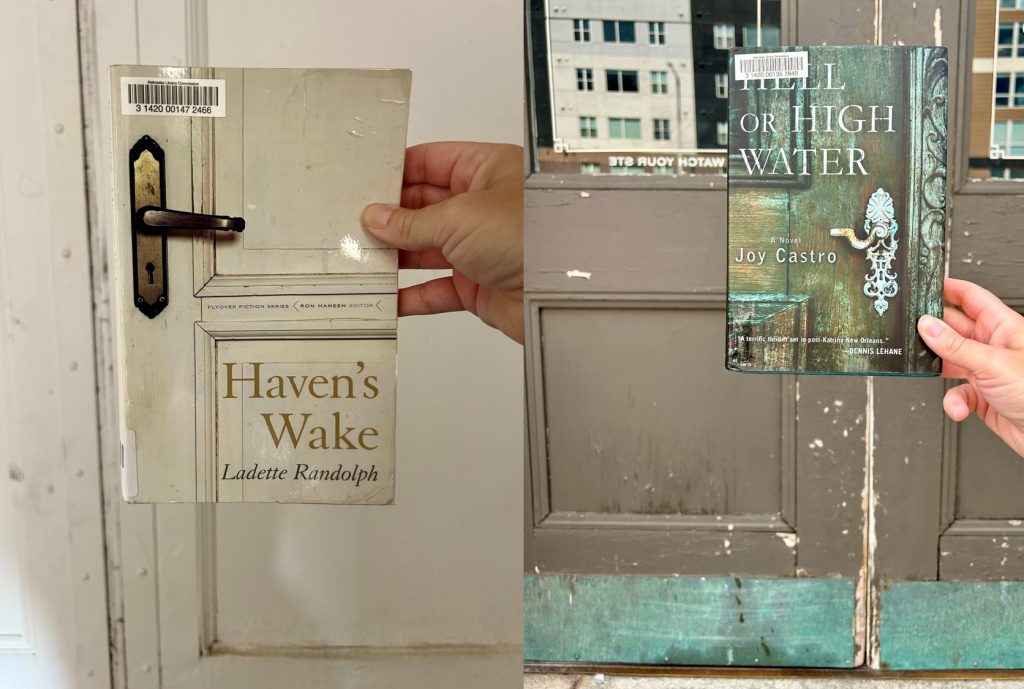
There’s nothing better than supporting Nebraska’s great literary talent by reading their books! This week’s #BookFaceFriday highlights two great Nebraska authors! “Haven’s Wake” by Ladette Randolph and “Hell or High Water” by Joy Castro, both novels are available as Book Club Kits for your library. Find more titles using the Nebraska-Related books located in the Browse Options section of our Book Club Kit Collection which includes fiction, nonfiction, adult, and kids/YA titles. Both “Haven’s Wake” and “Hell or High Water” can also be checked out through Nebraska OverDrive Libraries.
“With prose that vivifies the intricate patchwork of characters and captures the landscape’s simplicity, Haven’s Wake explores ‘the various attempts to explain the unexplainable,’ including family, faith, and death.”
—Katharine Fronk, Booklist Online
“A terrific mystery, but Hell or High Water is more than just a mystery; it’s a heartfelt examination of a second America–poor but undaunted–that was swept under the rug but refuses to stay there . . . I can’t wait to see what Joy Castro does next.”
– Dennis Lehane, New York Times bestselling author of Mystic River
Book Club Kits Rules for Use
- These kits can be checked out by the librarians of Nebraska libraries and media centers.
- Circulation times are flexible and will be based upon availability. There is no standard check-out time for book club kits.
- Please search the collection to select items you wish to borrow and use the REQUEST THIS KIT icon to borrow items.
- Contact the Information Desk at the Library Commission if you have any questions: by phone: 800/307-2665, or by email: Information Services Team
Libraries participating in the Nebraska OverDrive Libraries Group currently have access to a shared and growing collection of digital downloadable audiobooks and eBooks. 194 libraries across the state share the Nebraska OverDrive collection of 26,898 audiobooks, 36,794 ebooks, and 5,133 magazines. As an added bonus it includes 130 podcasts that are always available with simultaneous use (SU), as well as SU ebooks and audiobook titles that publishers have made available for a limited time. If you’re a part of it, let your users know about this great title, and if you’re not a member yet, find more information about participating in Nebraska Overdrive Libraries!
Love this #BookFace & reading? Check out our past #BookFaceFriday photos on the Nebraska Library Commission’s Facebook page!
#BookFaceFriday “The Underground Library” by Jennifer Ryan
Take a look, it’s in a #BookFaceFriday!

This week’s #BookFaceFriday is all about celebrating Library Card Sign Up Month! Join in with “The Underground Library: A Novel” by Jennifer Ryan (Ballantine Books, 2024). Libraries- More than Meets the Eye is this year’s theme. What can you do to help your community celebrate? Get out to your library, sign up for a library card, tell someone what you love about your library, and tell your local library staff how much you appreciate them! It’s that easy. This title is available as a an eBook and Audiobook through Nebraska OverDrive Libraries, and can be found in the specially curated collection “Library Card Sign Up Month,” which is filled with library themed titles.
“This uplifting and inspirational story is perfect for readers looking for heroic home front World War II novels with connections to actual events.”
— Historical Novel Society
Libraries participating in the Nebraska OverDrive Libraries Group currently have access to a shared and growing collection of digital downloadable audiobooks and eBooks. 194 libraries across the state share the Nebraska OverDrive collection of 26,898 audiobooks, 36,794 ebooks, and 5,133 magazines. As an added bonus it includes 130 podcasts that are always available with simultaneous use (SU), as well as SU ebooks and audiobook titles that publishers have made available for a limited time. If you’re a part of it, let your users know about this great title, and if you’re not a member yet, find more information about participating in Nebraska Overdrive Libraries!
Love this #BookFace & reading? We suggest checking out all the titles available for book clubs at http://nlc.nebraska.gov/ref/bookclub. Check out our past #BookFaceFriday photos on the Nebraska Library Commission’s Facebook page!
#BookFaceFriday – “On the Go with Senior Services” by Phyllis Goodman
Listen up, it’s #BookFaceFriday!
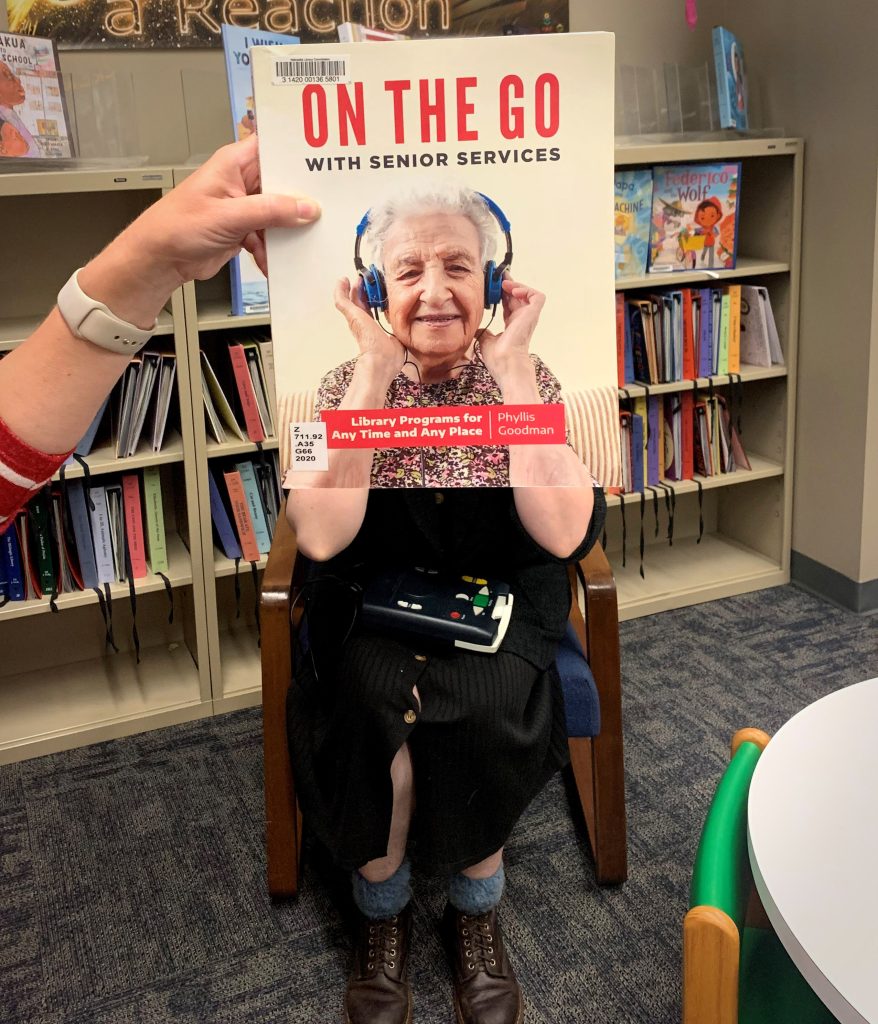
The Nebraska Library Commission is hiring! We are looking for a Marketing and Outreach Coordinator for our Talking Book and Braille (TBBS) department to help us recruit, retain, and engage our TBBS patrons.
The Talking Book and Braille Service is a no-cost braille and Audiobook library service for people with temporary or permanent low vision, blindness, or a physical or perceptual disability that prevents them from reading or holding the printed page or a reading disability. It’s one of the NLC’s core services and, while not limited to, is used by many Nebraska senior citizens.“On the Go with Senior Services : Library Programs for Any Time and Any Place” by Phyllis Goodman (Libraries Unlimited, 2020) is a part of NLC’s Library Science Collection, which provides professional and reference materials for Nebraska librarians and library science programs. This includes all librarians and library science students. The checkout period is 4 weeks, and items can be sent through the mail or picked up in person. You can find all of these books and more in our catalog, or reach out to our reference staff for a recommendation!
“Providing programming at senior living facilities may be uncharted territory for many libraries. If you’re looking to begin offering programs for senior residents, start your research with this book. Find inspiration to take seniors to the past or around the world, make everyone an artist or author, empower them to use technology confidently, and connect with people living with dementia.”
― Jennie Fidler, Special Services Coordinator, Oconomowoc Public Library
Love this #BookFace & reading? Check out our past #BookFaceFriday photos on the Nebraska Library Commission’s Facebook page!
Posted in Books & Reading, Education & Training, Library Management, Talking Book & Braille Service (TBBS)
Tagged Book Covers, bookface, bookfacefriday, books, Hiring, Librarians, Library Development, Library Science, Marketing Outreach Coordinator, On the Go with senior Services, Phyllis Goodman, TBBS
Leave a comment
Friday Reads : Flight Patterns, by Karen White
I recently picked up Flight Patterns, by Karen White, at a library book sale. And while the author was new to me, what really drew my attention was not just the description of the story, but of the story’s location: Apalachicola, Florida. Apalach, as it’s known to it’s residents, is a town not far from where I grew up and that offers some of the most beautiful homes, gorgeous beaches, and best seafood in the entire South. Flight Patterns tells the story of a woman coming home to the Apalach family she left behind – and to the woman she always wanted to be. In the telling of this woman’s story, Ms. White has done such a magnificent job of describing the beauty of the town, area and people, that it brought back many fond memories of summer days there with my family. As per my usual habit, I both read and listened to this title, and was riveted from beginning to end, as I’m sure you will be too!
Georgia Chambers has spent her life sifting through other people’s pasts while trying to forget her own. But then her work as an expert on fine china – especially Limoges and the mystery surrounding a particular pattern – requires her to return to the one place she swore she’d never revisit: her home town.
It’s been 13 years since Georgia left her family home on the coast of Florida, and nothing much has changed except that there are fewer oysters and more tourists. She finds solace in seeing her grandfather still toiling away with his bees in the apiary where she spent much of her childhood, but encountering her estranged mother and sister leaves her rattled. Seeing them after all this time makes Georgia realize that something has been missing – and unless she finds a way to heal these rifts, she will forever be living vicariously through other people’s remnants. To embrace her own life – mistakes and all – she will have to find the courage to confront the ghosts of her past and the secrets she was forced to keep. **Synopsis courtesy of Audible
#BookFaceFriday “The Book of Unknown Americans” by Cristina Henríquez
Did you know it’s #BookFaceFriday?
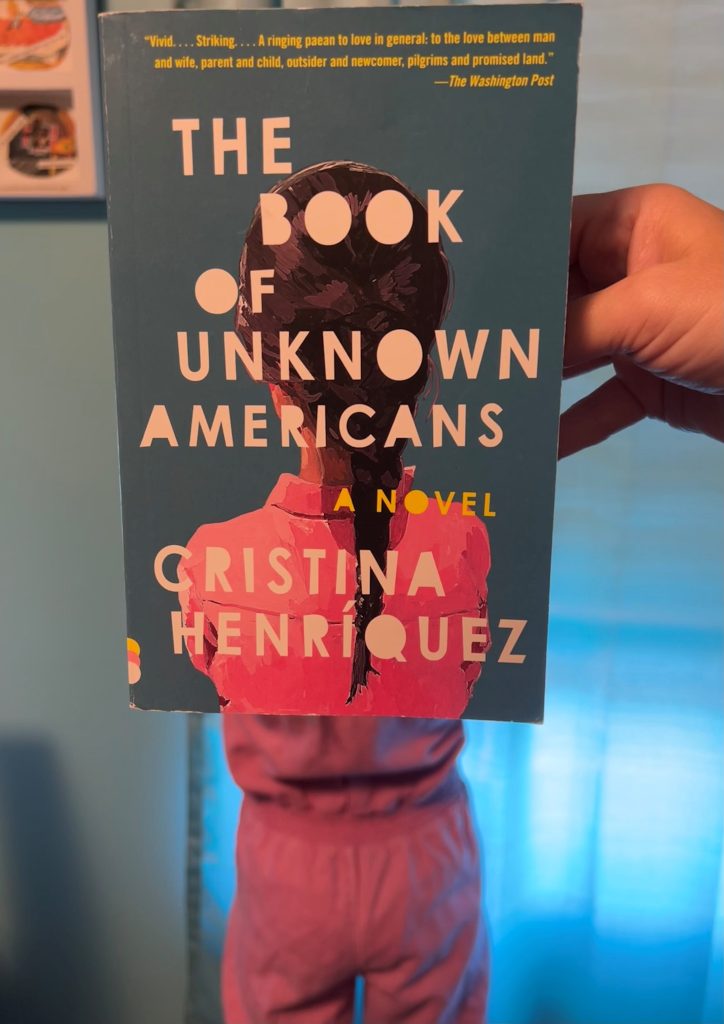
Don’t blame us for judging a book by its cover – this one was just asking to become this week’s #BookFace! But sometimes those first impressions prove to be correct; “The Book of Unknown Americans” by Cristina Henríquez, was “named a New York Times and Washington Post Notable Book, an NPR Great Read, The Daily Beast’s Novel of the Year, and a Mother Jones, Oprah.com, School Library Journal, and BookPage Best Book of the Year.” This title is available as a part of our Book Club Kit collection, and also as an eBook and Audiobook through Nebraska OverDrive Libraries. Will your book club enjoy it? Only one way to know for sure…
“There’s an aura of benevolence in these pages…. Henríquez’s feat is to make the reader feel at home amid these good, likable people.”
—The Wall Street Journal
“Unfailingly well written and entertaining…. [Henríquez’s] stories illuminate the lives behind the current debates about Latino immigration.”
– The New York Times Book Review
Book Club Kits Rules for Use
- These kits can be checked out by the librarians of Nebraska libraries and media centers.
- Circulation times are flexible and will be based upon availability. There is no standard check-out time for book club kits.
- Please search the collection to select items you wish to borrow and use the REQUEST THIS KIT icon to borrow items.
- Contact the Information Desk at the Library Commission if you have any questions: by phone: 800/307-2665, or by email: Information Services Team
Libraries participating in the Nebraska OverDrive Libraries Group currently have access to a shared and growing collection of digital downloadable audiobooks and eBooks. 194 libraries across the state share the Nebraska OverDrive collection of 26,898 audiobooks, 36,794 ebooks, and 5,133 magazines. As an added bonus it includes 130 podcasts that are always available with simultaneous use (SU), as well as SU ebooks and audiobook titles that publishers have made available for a limited time. If you’re a part of it, let your users know about this great title, and if you’re not a member yet, find more information about participating in Nebraska Overdrive Libraries!
Love this #BookFace & reading? Check out our past #BookFaceFriday photos on the Nebraska Library Commission’s Facebook page!
#BookFaceFriday “The White House: A Meet the Nation’s Capital Book” by Lindsay Ward
This #BookFaceFriday is in Washington D.C.!
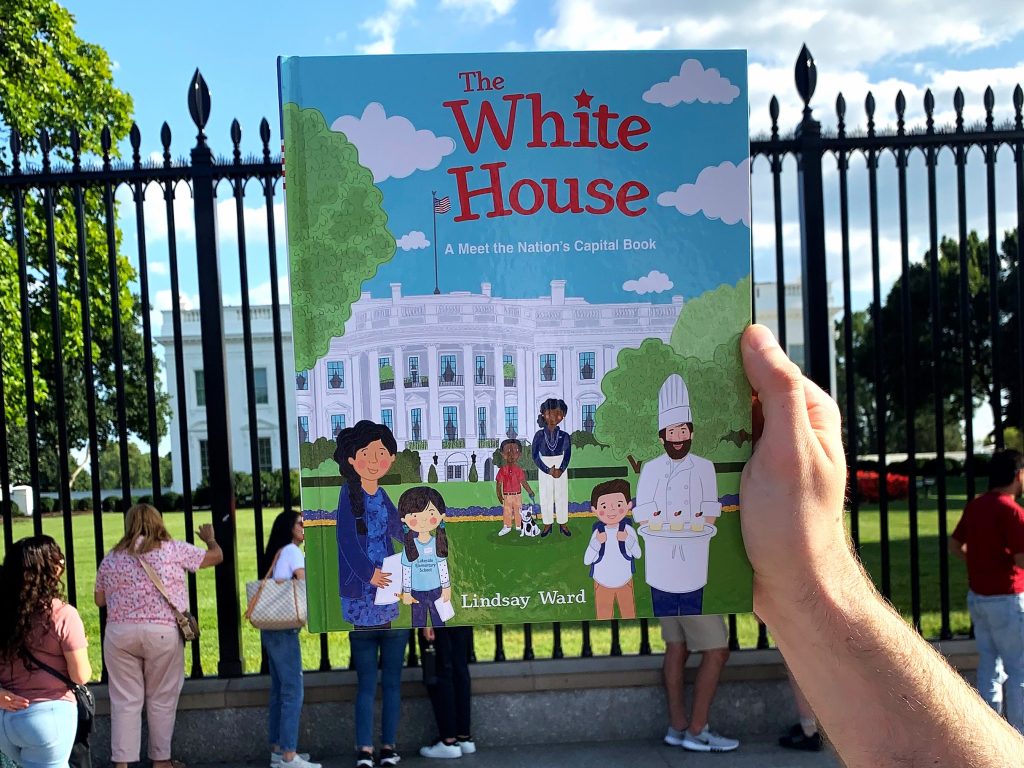
There’s so much to learn in this week’s #BookFace! “The White House: A Meet the Nation’s Capital Book” by Lindsay Ward (HarperCollins, August 2024) is a fun, interactive picture book that’s perfect for educating kids on the inner workings and different people who work inside of the White House.
“An expansive reminder that our government is of, as well as by and for, the people.” —Kirkus Reviews
We couldn’t resist bringing this week’s bookface with us to the National Book Festival in Washington, D.C.! The Nebraska Center for the Book has selected one youth book and one adult book by Nebraska authors to represent the state at the 2024 National Book Festival: “Eat Your Woolly Mammoths!: Two Million Years of the World’s Most Amazing Food Facts, from the Stone Age to the Future” by James Solheim and “Dancing with the Octopus: A Memoir of a Crime” by Debora Harding. Both titles will be part of the National Center for the Book’s Great Reads from Great Places program. Check out the festival schedule, featured authors, and highlights for past events on the Library of Congress’s event page!
This title comes from our large collection of children’s and young adult books sent to us as review copies from book publishers. When our Children and Young Adult Library Services Coordinator, Sally Snyder, is done with them, the review copies are available for the Library System Directors to distribute to school and public libraries in their systems.
Love this #BookFace & reading? Check out our past #BookFaceFriday photos on the Nebraska Library Commission’s Facebook page!
#BookFaceFriday “Murder on a School Night” by Kate Weston
We did our homework- it’s #BookFaceFriday!
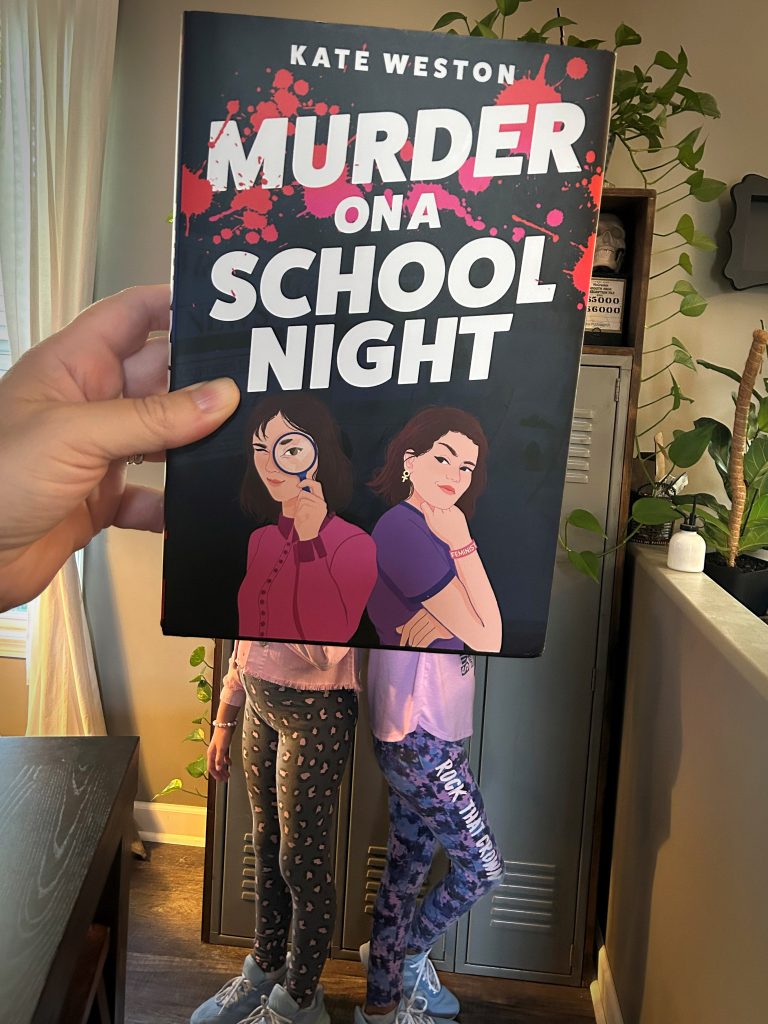
Don’t let the first few week’s of school push you over the edge! Back to school can be stressful, but finding great books for your kids to read doesn’t have to be. Whether its through our Book Club Kits collection, eBooks and Audiobooks in Nebraska OverDrive Library, picking up a title from our giveaway books. there is something for everyone in at all reading levels. Like this week’s #BookFace! “Murder on a School Night” by Kate Weston (Katherine Tegen Books, 2023) this funny, witty murder mystery for teens is written by a former stand up comedian and bookseller.
“Mean Girls meets Midsomer Murders with a dash of Louise Rennison in this genre-blending story that centers girls’ friendships and two ambitious best friends. Kerry and Annie are self-absorbed friends whose obsession over their lack of popularity results in hysterically funny dialogue and a lighthearted tone. Kerry’s crush on newcomer Scott offers sweet diversions. However, what really elevates the goofy capers and over-the-top scheming is how well Kerry and Annie know both themselves and each other. Secrets add depth and complexity to this insightful parody of teenage life. A nuanced, hilarious page-turning romantic mystery.” —Kirkus Reviews
This title comes from our large collection of children’s and young adult books sent to us as review copies from book publishers. When our Children and Young Adult Library Services Coordinator, Sally Snyder, is done with them, the review copies are available for the Library System Directors to distribute to school and public libraries in their systems.
Love this #BookFace & reading? Check out our past #BookFaceFriday photos on the Nebraska Library Commission’s Facebook page!
Posted in Books & Reading, General, Youth Services
Tagged back to school, Book Covers, bookface, bookfacefriday, Kate Weston, Murder on a School Night, Reading
Leave a comment
#BookFaceFriday “Proud” by Ibtihaj Muhammad
En guard! It’s #BookFaceFriday!
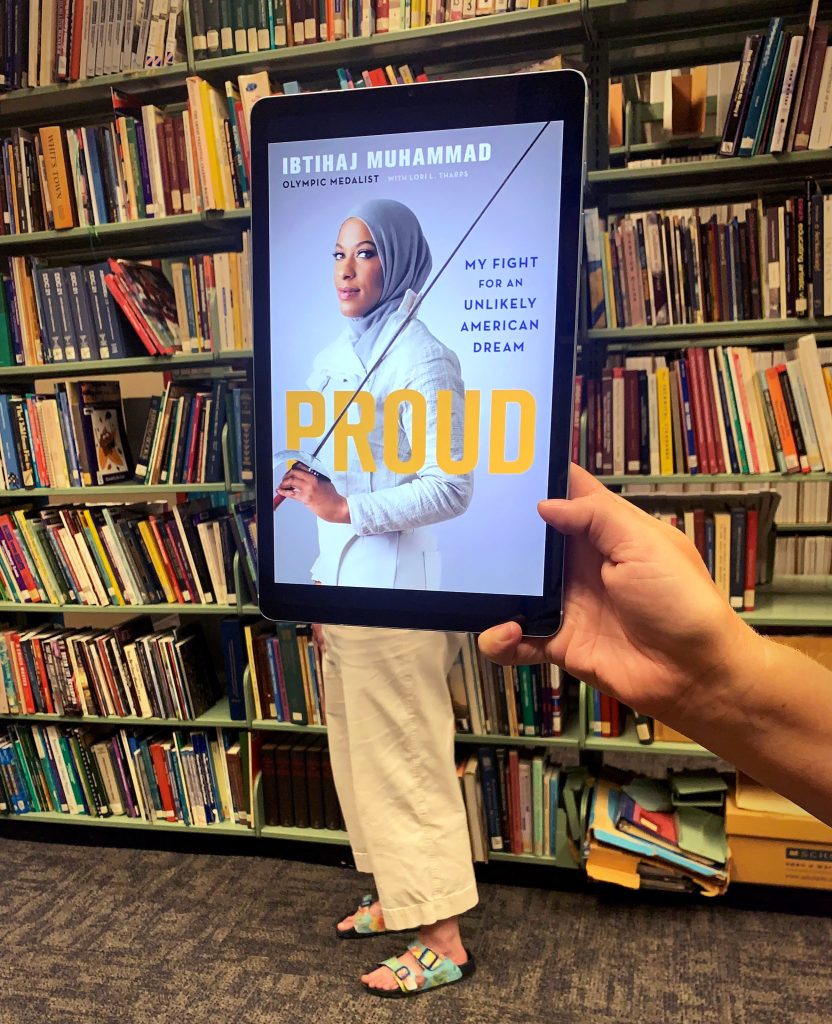
On the fence about what to read this weekend? Why not check out one of the many titles about the Olympic Games and athletes available on Overdrive. This week’s #BookFace, “Proud: My Fight for an Unlikely American Dream” by Ibtihaj Muhammad with Lori Tharps, is the memoir of Olympic bronze medalist and Muslim American, Ibtihaj Muhammad. You can find this title as an Audiobook through Nebraska OverDrive Libraries, as well as her Young Readers Edition “Proud: Living My American Dream” which is available as both an eBook and Audiobook.
“Fencing made her who she is today, but fencing isn’t her only narrative. Her journey is one of authenticity at all costs and being unapologetically herself.”
—ESPNw
Libraries participating in the Nebraska OverDrive Libraries Group currently have access to a shared and growing collection of digital downloadable audiobooks and eBooks. 194 libraries across the state share the Nebraska OverDrive collection of 26,898 audiobooks, 36,794 ebooks, and 5,133 magazines. As an added bonus it includes 130 podcasts that are always available with simultaneous use (SU), as well as SU ebooks and audiobook titles that publishers have made available for a limited time. If you’re a part of it, let your users know about this great title, and if you’re not a member yet, find more information about participating in Nebraska Overdrive Libraries
Love this #BookFace & reading? Check out our past #BookFaceFriday photos on the Nebraska Library Commission’s Facebook page!
#BookFaceFriday “Storm Cursed” by Patricia Briggs
Brace yourself, it’s #BookFaceFriday!
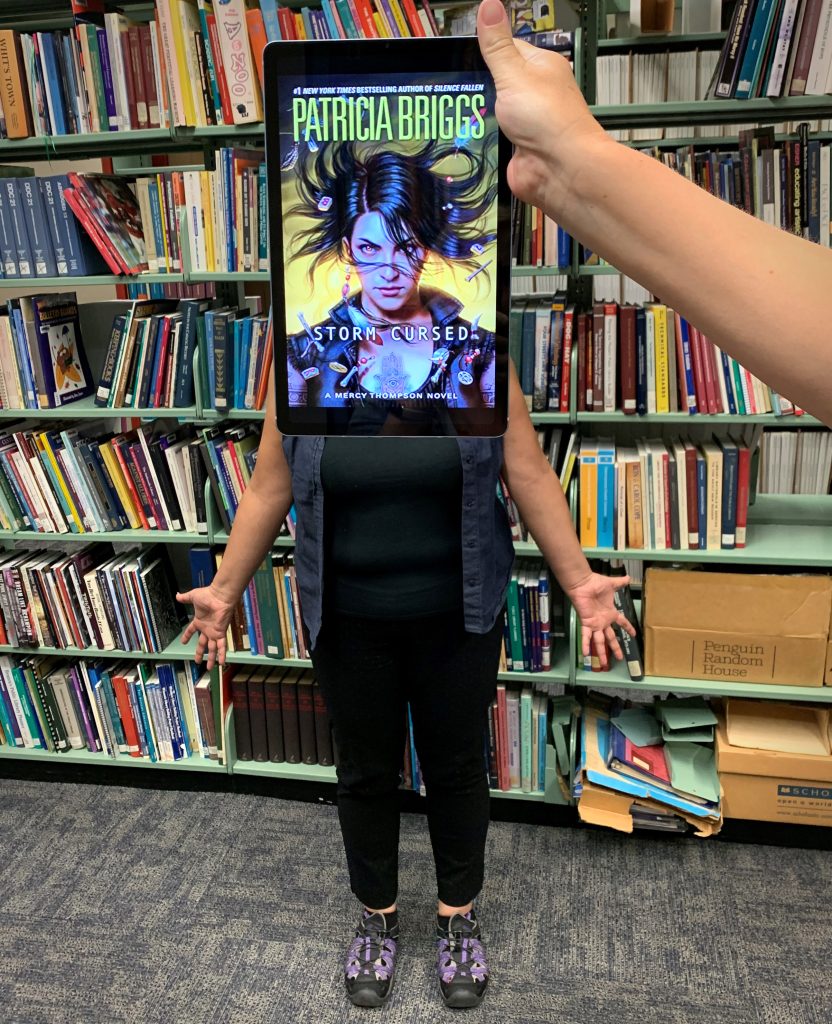
There’s nothing like reading by candlelight, or maybe in this case, by the light of your e-reader. Batten the hatches during the next Nebraska storm with a good book. This week’s #BookFace would be an excellent book to escape into; “Storm Cursed” by Patricia Briggs, is book eleven in Brigg’s Mercy Thompson series. This supernatural shapeshifter series combines adventure, wit, and magic. It’s available as both an eBook and audiobook in Nebraska OverDrive Libraries, along with fourteen other books in the Mercy Thompson series.
“This story brings together a lot of seemingly unrelated plot threads from past novels in a way that feels organic and that doesn’t impede the pacing of the current mystery. Fans of the series will enjoy this solid addition, but new readers might find that there’s too much history to make this story work as an ingress point.” —Publishers Weekly
“Patricia Briggs never fails to deliver an exciting, magic and fable filled suspense story.” – Erin Watt, #1 New York Times bestselling author of The Royals series
This week’s model is one of the newer additions to the Nebraska Library Commission. Welcome, Veronica Powell, as our new Cataloging Librarian!
This title is also available as an audiobook through Nebraska OverDrive Libraries. Libraries participating in the Nebraska OverDrive Libraries Group currently have access to a shared and growing collection of digital downloadable audiobooks and eBooks. 194 libraries across the state share the Nebraska OverDrive collection of 26,898 audiobooks, 36,794 ebooks, and 5,133 magazines. As an added bonus it includes 130 podcasts that are always available with simultaneous use (SU), as well as SU ebooks and audiobook titles that publishers have made available for a limited time. If you’re a part of it, let your users know about this great title, and if you’re not a member yet, find more information about participating in Nebraska Overdrive Libraries!
Love this #BookFace & reading? Check out our past #BookFaceFriday photos on the Nebraska Library Commission’s Facebook page!
